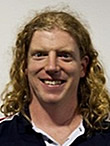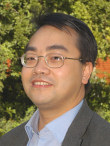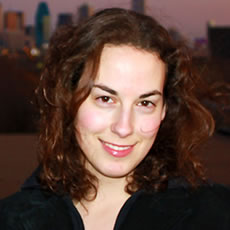 Dr Kenton Arkill
Dr Kenton Arkill
Dr Kenton Arkill is a biophysicist and microscopist based in Physics and Astronomy researching microfluidics and permeability of the microcirculation.

Isaac is specialised in the field of physical and powder metallurgy, as well as nanoscience and nanotechnology. His research interests range from advanced consolidation and alloy development of commercial micron-sized powders for pore-free engineering components to novel green (e.g. precursor-free) synthesis of nanoparticles with well controlled structure and composition, for industrial applications in transport, energy, healthcare, defence and electronics sector
Dr Mark Cobbold is an immunologist with an interest in engineering biological molecules that could specifically target malignant cells.
Selected publications from Dr Cobbold
Dr Liam Cox's research focuses on glycolipids and their role in CD1d-mediated immunity. In the area of synthetic biology we looking to develop methods for generating CD1d–glycolipid conjugates either through protein modification or by incorporating homologation 'tags' into our glycolipid substrates. We are also fabricating model cell membranes for probing how the incorporation of CD1d agonists modifies membrane behaviour.
Selected publications from Dr Cox
Tim Dafforn develops novel detection systems based on the behaviour of spaghetti-like viruses in flow.
Selected publications from Professor Dafforn
In the video below, Professor Dafforn describes his research in 60 seconds.
Video transcript here
Dr Fernandez-Trillo work on the novel polymeric materials that can find applications at the Chemistry Biology-Interface. His research has found application in Biocatalysis, Magnetic Resonance Imaging, Sensing, and Synthetic Biology.
Selected publications from Dr Fernandez-Trillo
Gerard Fernando is a Professor of Polymer Engineering and the Head of the Sensors and Composites group in the School of Metallurgy and Materials. His research interests lie in innovation around chemical process monitoring using fibre optic sensor systems; structural integrity monitoring; clean and energy efficient manufacture of composites; self-sensing composites; multi-functional sensors; synthesis and characterisation of novel materials and smarter materials.
Dr Oppenheimer’s research interests lie in nano and submicron structure formation (please see the group website: Advanced Nano-Materials, Structures and Applications) at surfaces and in thin films, including pioneering the potential use of hierarchical electrohydrodynamically generated functional structures to develop novel polymer-based nano-detection devices. She brings detailed expertise in creating and aligning a wide range of nanostructures in polymers, carbon nanotube-based nanocomposites, crystalline materials and a synergistic interest in biomimetics, including the use of polymers with 10-nm morphologies as templates to create inorganic functional devices
Liam Grover studies the interactions that occur between materials and biological system. An improved understanding of these interactions have allowed him to develop novel therapies for tissue regeneration. He has developed systems that enable the growth of tissues outside the body and is exploring clinical translation of these technologies.
Selected publications from Professor Grover
Dr Sara Jabbari models gene regulation networks using mathematics to examine the effects of altering aspects of these networks.
Selected publications from Dr Jabbari
Mapping and visualising the potential and free energy landscapes of model proteins (e.g. using off-lattice bead models) and cyclic peptides (AMBER force field modelling). Global optimisation (finding lowest energy structures). Calculation of circular dichroism spectra of cyclic peptides and comparison with experimental data (e.g. NMR studies of Dr Anna Peacock).
Selected publications from Professor Johnston

Dr Krachler's group develops anti-virulence strategies to counteract multidrug resistant bacterial infections. The focus right now is on engineering adhesion inhibitors that competitively inhibit pathogen binding and tissue colonization.
Video transcript here
Dr Paula Mendes research interests lie in the development of surface materials with stimuli-responsive and novel biofunctional properties.
Selected publications from Dr Mendes
Dr Anna Peacock researches the de novo design of coiled coils and miniature protein architectures. In particular her group focus on the design of metallopeptides.
Selected publications from Dr Peacock
Dr Pikramenou 's research group studies the development of luminescent nanoprobes and their interaction with biomolecules to monitor cellular events.
Selected publications from Dr Pikramenou
Professor Preece is interested in the design, synthesis and characterisation of; novel peptides for delivery of DNA/RNA for application in gene delivery; biocompatible surfaces for sensing biological important analytes; and the analysis on nanoparticles when interacting with biological samples.
Selected publications from Professor Preece
Alex Robinson is a Senior Research Fellow of the Science City Research Alliance between the Universities of Birmingham and Warwick, based in the School of Chemical Engineering at the University of Birmingham.
His research focus is on the development of new materials and techniques for nanofabrication using electron beam lithography and next generation techniques such as extreme ultraviolet lithography, together with the development of novel devices and nanopatterned surfaces
Zoe Schnepp is a Birmingham Fellow and her research focus is the creation of functional nanomaterials from renewable resources. In particular, she is interested in using biomass to produce sustainable catalysts for various applications, such as energy generation and transfer.
Artemis Stamboulis has research interests in the microstructural characterisation of materials for biomedical applications. She has published over 40 research papers in international scientific journals. Artemis has an active research group and has supervised more than 30 postgraduate students.
Artemis teaches at both undergraduate and postgraduate level (MRes in Biomaterials) and is interested in Education Research and particularly in Threshold Concepts in Engineering, a research activity that is funded by the Royal Academy of Engineering
Professor Jim Tucker works on the design and study of modified nucleic acids, in particular those containing metal-based and luminescent sub-units.
Selected publications from Professor Tucker
Peter Winn's group develops and applies computational techniques for the analysis and re-engineering of protein function and protein interactions.
Selected publications from Dr Winn